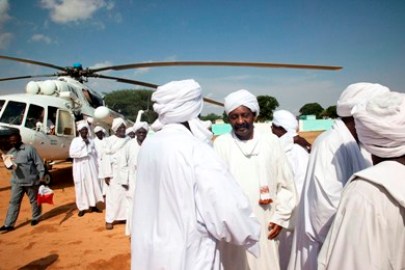DRA launches reconciliation initiative to end Rizeigat, Ma’alia feud
August 29, 2014 (KHARTOUM) – Leaders of the warring Rizeigat and Ma’alia tribes in East Darfur state have accepted a reconciliation initiative launched by the Darfur Regional Authority (DRA) to end the bloody clashes which claimed the lives of hundreds of tribesmen.

On 16 August, fighting erupted between the Rizeigat and Maalia tribes in East Darfur after theft of livestock belonging to Ma’alia in Abu-Rakoba area, leaving 200 dead and hundreds wounded from both sides.
The Rizeigat attacked the area of Um-Rakoba inhabited by Maalia several times last week. The genesis of the conflict between the two tribes from last week was a dispute over land ownership claimed by both tribes.
The ministerial committee has arrived in North Darfur state capital of El-Fashir from East Darfur state capital of El-Daein on Thursday and embarked on arrangements to hold intensive meetings with the concerned bodies within the framework of implementing what has been agreed upon by the two tribes.
Sissi directed the committee to implement the agreement within 72 hours in coordination and cooperation with local administration and public opinion leaders in Darfur.
The government recently launched a number of conferences to mitigate the tensions and pacify the troubled region. However the spread of weapons and the implication of armed tribesmen belonging to government militias hampered these efforts.
Last July, vice-president Hassabo Abdel Rahman tried to mediate between the two tribes and organise a reconciliation conference in Al-Foula in West Kordofan state.
However, the meeting was cancelled after the Rizeigat rejected the participation of some Ma’alia members, saying they belong to another tribe. The Ma’alia were also skeptical about the involvement of the vice-president who is a member of Rizeigat tribe.
The two tribes also failed to hold another conference scheduled for 10 August.
The DRA information minister, Abdel-Karim Musa, told the official news agency SUNA that the two sides agreed to implement an immediate cessation of hostilities as a prelude to a final deal to end the bloody conflict between Rizeigat and Ma’alia.
He underscored seriousness of the central government and the DRA to move forward to impose the state’s authority in order to protect people’s lives and make the necessary procedures to prevent a recurrence of fighting.
More than 110 people were killed in violent clashes between two Arab tribes in August 2013 while 39 others were killed in September following collapse of the fragile truce between the two tribes.
Last month, more than 31 people were killed in renewed clashes between the two tribes.
Both the Rizeigat and the Maalia are pastoralist tribes, based in East Darfur. The centre of Rizeigat territory is in El Daein town, while the Maalia centre is in Adila, the second largest town after El Daein.
Tribal fighting has intensified during the last two years in Darfur and Kordofan regions in western Sudan leading to thousands of dead and injured and forcing over 300,000 people to flee their homes.
Observers agree that clashes typically occur between tribal groups that in the past fought against rebel forces alongside the government and have strong militias.
Analysts also underline that the emergence of strong militias eroded the authority of tribal leaders as they can no longer challenge the militia chiefs who have money and means provided by the army and security services.
Different officials in Darfur, including Sissi, said that tribal violence is among the biggest threats to ongoing efforts to implement a peace document signed by two former rebel groups in the region.
(ST)
